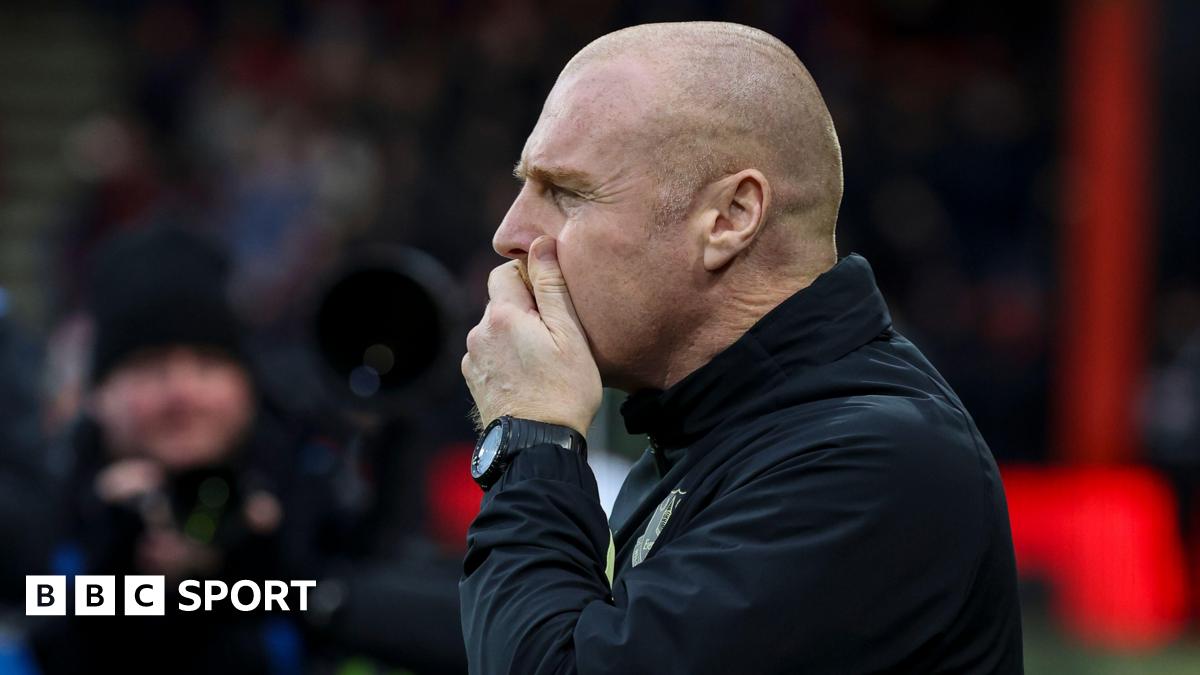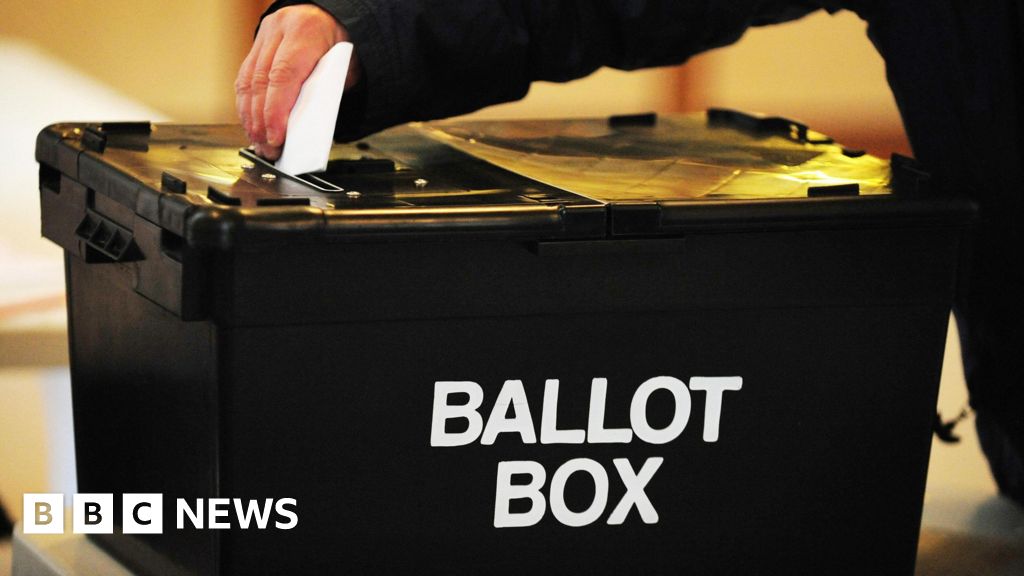
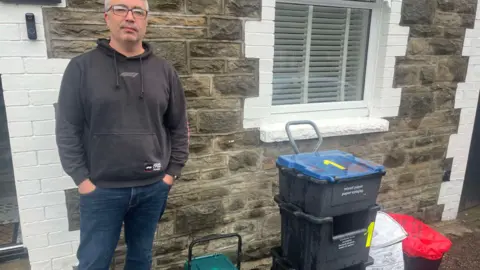 BBC
BBC
Mark Underdown, from Blaina, recently moved from England and says Wales' recycling means he no longer has to use his black bin at all
Homes in Wales have the highest average number of bins in the UK, research shows, with some residents branding them ugly and dangerous.
The country is currently second in the world for recycling household waste, only behind Germany, and the Welsh government says separating it all is the reason why.
But with that comes up to 10 bins per household, with Blaenau Gwent, Merthyr Tydfil and Neath Port Talbot among those with the most waste to sort in the UK.
Some people living in Blaenau Gwent said bins were often kept on pavements as people did not have room in their homes, which blocked the walkway and made the area look ugly.
But others thought the recycling options in Wales were “really good”.
The council said six bins were provided as a matter of course - paper, plastics, cans, glass, cardboard and food - alongside non-recyclable waste.
Residents can also choose to have textiles, batteries, small electrical items, garden waste and nappies collected - some of which require additional containers.
Recent research, carried out by tax reform campaign group Taxpayers’ Alliance, stated Blaenau Gwent and Merthyr Tydfil had the highest number of possible bins in the UK, at ten.
It also said the Welsh average of six bins per household was higher than any other UK region.
But according to the councils' standard-issue lists, Neath Port Talbot had the most available bins in Wales, at nine, while Gwynedd had the lowest, at five.
This did not include optional collections of specific items.
In addition, new waste recycling regulations were introduced by the Welsh government in April, meaning all waste from offices, businesses and holiday lets were also legally required to be sorted for recycling.

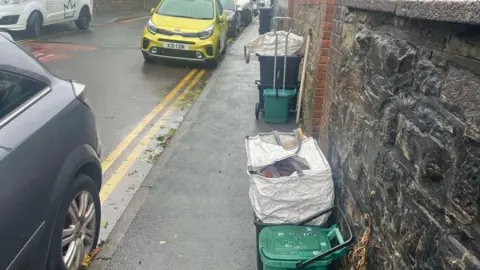
Boxes, bins and bags line the streets outside houses where there is no alternative storage area
Residents in Blaina, Blaenau Gwent, had mixed views on the effectiveness of the multiple bins system.
Keziah Jones, 35, said she was unhappy with the situation, adding: “We had bags before, which were much more practical, because I could keep them in my kitchen cupboards. These are so ugly.”
She said while a trolley was provided to help stack the containers, “you can’t get replacements anymore and they break quite a lot in the wind”.
Ms Jones said she had no choice but to permanently keep the bins right outside her front door.
“I couldn’t drag all that through the house myself, our kitchen is on the second level," she said.
“My grandmother also lives on this street, and these [bins] are so unmanageable. She can’t pull that trolley around, it’s a nightmare for the elderly.”
She added the bins could be “dangerous” as they blocked the pavements.
“When my little boy was younger and I had him in a buggy, I had to go out into the road,” she said.
Stephen Pegler, 68, said sorting the items was “not a big deal”, but added: “There are so many rumours about recycling, because we see them unloading… What annoys me is we are going to the bother of sorting it and then they’re just all going in the same place.”

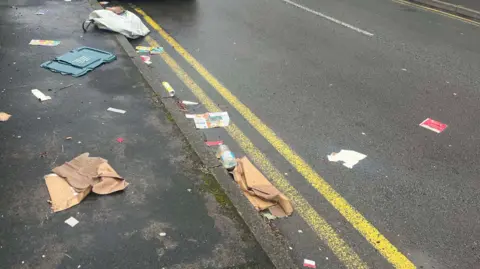
One resident said the multiple bins took too long to be emptied, leading to strewn rubbish
Elizabeth Gething, 77, lives alone and said she did not have enough recycling to fill all the bins.
She added: “A lot of people don’t wash and sort [their recycling]. It depends if people can be bothered or not.”
On a wet and windy day, Ms Gething was picking up rubbish from the street.
“It’s 10 o’clock now and the dustbin men are still not here, it’s awful. They should come a lot earlier," she added.
Paul Harrington, 72, said he was building a bin store as part of ongoing home renovations.
“I’m lucky because this is something I’m in the middle of doing anyway, but a lot of others have them stuck outside their front doors,” he said.
“I don’t mind sorting it all out at all, it’s good for the environment.”
Mark Underdown, 42, moved to Blaina about three months ago from Camberley, Surrey, where “they do it completely differently”.
“I think recycling in Wales is really good to be honest,” he said. “We don’t even use our black wheelie bins because we recycle everything.”

 Miloš Fišar
Miloš Fišar
Dr Tommaso Reggiani says it's important to educate people about recycling
The Taxpayers’ Alliance’s chief executive, John O’Connell, argued councils in Wales were "placing an enormous burden on households through the often mind-bogglingly complex system of waste separation”.
But campaign group Wales Recycles said not separating waste meant councils were "less likely to be able to sell our recycling to businesses that need good quality materials to create new products".
Dr Tommaso Regianni, a senior lecturer at Cardiff University’s business school, who has conducted research in behavioural economics, explained that while recycling “might seem free”, there were actually many associated costs.
These included physical costs, in finding the space for multiple bins, but also psychological costs such as time and the tension it could create within households.
“As human beings, we always tend to minimise costs,” he said.
“Multiple bins increases the amount of cost in complying with regulations, people can feel a bit overwhelmed and then the unintended outcome is you have an increase in the black bin [usage].”
He said people could be further de-motivated by the “common good” element, whereby if they complied but others around them did not, they felt their effort was worthless.
Dr Reggiani suggested while fines were often the default solution, more positive, rewards-based enforcement, such as council tax reductions, could produce better results.
He said a good example of this was bottle deposit schemes, where participants felt they were being rewarded, even if they had paid for the bottle upfront.
Dr Reggiani added scientific testing of schemes was necessary, as well as educating on recycling from a young age.
Blaenau Gwent council said: “Separating recyclables at the kerbside means lower levels of contamination and as a result the materials are worth more at the other end.
“We are currently recycling at around 66% in Blaenau Gwent which is above the last target set by Welsh government.”
The Welsh government added Wales' recycling ranking was "achieved by keeping materials separate to increase recycling rates and reduce the amount of waste we send to incineration and landfill".
 (1).png)
 4 months ago
8
4 months ago
8

